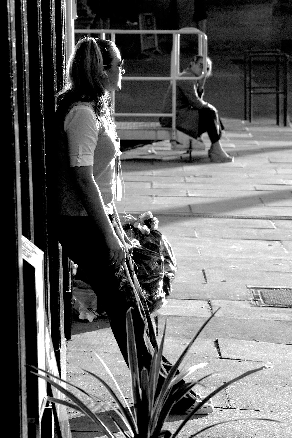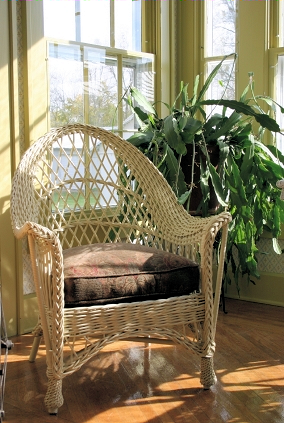 “Come on in and make yourself comfortable,” he said warmly, gesturing toward the west side of the large, sunny room where a couch and two chairs separated by a small table were arranged casually in a semi-circle. “Sit wherever you’d like,” he continued as he picked up a manila folder from the desk on the far wall and sat down in the large, overstuffed chair in the middle of the room facing the other furniture.
“Come on in and make yourself comfortable,” he said warmly, gesturing toward the west side of the large, sunny room where a couch and two chairs separated by a small table were arranged casually in a semi-circle. “Sit wherever you’d like,” he continued as he picked up a manila folder from the desk on the far wall and sat down in the large, overstuffed chair in the middle of the room facing the other furniture.
“Thank you,” she said softly, selecting the wicker chair with the seat cushion, as he made a mental note of her choice. She had picked the most uncomfortable seat in the room. The one that would require her to sit virtually upright during their entire time together since it offered the least lumbar support and made squeaky, squishy noises when its occupant squirmed in a vain attempt to find a more suitable position. However, it was deliberately placed most directly across from and in line with his chair. By the time she returned next week, the chairs would be rearranged to facilitate his observation of whether she will pick the same chair or the chair in the same position relative to his.
“You’ve been across the street a good while,” he said. “I saw you there when I arrived for my first appointment this morning. That was more than two hours ago.” He studied her expression.
“I arrived early,” she responded, squirming in the chair in a futile effort to get comfortable.
“Did you forget what time the appointment was?” he probed.
 “No,” she said declaratively, without expounding.
“No,” she said declaratively, without expounding.
“Well, why don’t you tell me a little bit about yourself and what brings you in today.” He smiled encouragingly as their eyes met.
Without removing the large sunglasses that shielded her deep-set blue eyes, she began. “Well, I just wanted someone to talk to . . . about things. I found your name in the Yellow Pages and, since your office is not far from my house, I decided to come meet you and give this a try.”
“What kinds of things would you like to talk about?” he inquired, opening the manila file folder and removing a single sheet of lined white paper. From the table to the right of his chair, he picked up a ballpoint pen and held it in the fingers of his right hand, poised to begin jotting down notes as she spoke.
“There have been a lot of changes in my life lately,” she started hesitantly. “I just want to figure out where I’m going from here.”
“All right,” he replied. “Why don’t you tell me about what has changed.”
“My mother died,” she stated matter-of-factly. “I was living with her, so now I’m living alone in her house. She left it to me.”
“I’m sorry for your loss. How long ago did she pass?” He continued holding the pen, but did not begin writing.
“Six months ago. I moved back in with her so that I could take care of her. My brother is married and has a couple of kids. He and his wife both work, so since I am single, I decided that I should be the one to move in and see her through to the end.” She spoke with little emotion. “She had cancer. Colon cancer. We thought she was cured . . . it had been more than ten years. But one day she found a lump in her neck, so she went to the doctor. Turned out the cancer had come back and spread to her bones. They tried chemotherapy again, but it didn’t work.”
“How long was she ill? After the recurrence, that is,” he clarified.
“It was almost a year,” she continued, “from the time she was diagnosed until she died. I stayed with her the whole time. I didn’t want her to die in a hospital or hospice. I quit my job — I hated it, anyway — and moved into her house. I didn’t know that she planned to leave the house to me, but she did so now I need to figure out if I want to stay there or sell it and move somewhere else.”
“Have you ever been married?” he inquired.
“Yes, I was.” She stopped speaking and began fumbling with the iPod that she had continued to grasp with her left hand since entering the office. “But I got divorced about three years ago. I don’t have any kids. Can I smoke in here?”
“No, I’m sorry, but I do not allow patients to smoke in my office,” he said gently, but firmly. He stopped and made a few notes on the blank piece of paper.
When he was finished, he looked directly at her and asked pointedly, “I’m curious . . . why did you arrive so early today and spend a couple of hours standing across the street from my office?”
At least, she removed her sunglasses and laid them in her lap next to the iPod. “Well, I got off work and didn’t feel like going home first. I work nights in the emergency room at the hospital down the street,” she explained as she pointed to the identification badge and electronic key card dangling from a lanyard around her neck, “and I got off work a little after 7:00 a.m. I didn’t have time to go home and sleep, plus . . . ” she hesitated for a moment, “I was afraid that if I went home, I wouldn’t come back.” She picked the sunglasses up from her lap and perched them atop her head as she considered his expression. “I had to satisfy my curiosity. I wanted to see what kind of people were coming in and out of here, see if I could catch a glimpse of you . . . you know . . . check things out a bit before deciding.” She reached into the pocket of her jeans and retrieved a pack of gum. “Want a piece?” she said holding the package out to him.
“No thank you,” he replied, holding up his left palm and waving it gently to signify his declination of her offer. “I’m fine.”
He closed the manila file folder and placed it, along with the pen, back on the table next to him. Then he leaned forward, his elbows on his knees and looked into her eyes. “So?”
“So what?” she said with feigned casualness, pretending not to understand the import of his question.
Content to play along, he continued, “So are we going to do some work together here in this office? Did I pass inspection? Are you ready to get real and tell me what’s going on in your life that led you to make this appointment with me? I just want to know if we’re done doing this little dance and ready to rock and roll. I’m not everybody’s cup of tea and that’s cool. If you don’t think we can work together, you can go. I won’t even bill you. We’ll just consider this little ‘look-see’ a freebie . . . not the right fit, ‘have a nice life.’ It’s up to you.”
She squinted slightly as she studied his square-set jaw, tousled dark brown hair with a few random-appearing streaks of gray, and soft green eyes. “You have an accent. Where are you from?” she asked.
“Scotland, originally. But I’ve been a citizen of this country for nearly twenty years now,” he explained. “You’ll find that my accent becomes much more pronounced after I’ve been home for a visit. But after a few weeks, it fades away again. And that is the last personal question I will answer. It is not appropriate, within the context of the psychotherapist-patient relationship, for me to discuss details about my life with you.” His brogue was still readily discernible, especially with particular combinations of letters such as “er.” When he said “personal,” it sounded more like “parsonal.” She found herself charmed by his manner of speech.
“So what do you think? Wanna stick around and talk for awhile?”
“First, I have just one more question,” she announced firmly. “Not about your personal life, though.”
“All right then,” he leaned back, placing his arms on those of the chair. “Shoot.”
“Can I move into that other chair? This is the most uncomfortable contraption I have ever tried to sit it. Here’s some advice: You should get rid of it. It’s horrid. I don’t know how anybody could talk about anything important while sitting in that thing.” Without waiting for his response, she picked up her iPod and moved to the upholstered chair opposite the table, sinking into it comfortably and crossing her legs. “Ah . . . better. Much better.”
“All right,” he smiled. “If you’re ready to get started, tell me more about what brings you here today.”
As she began speaking, he retrieved the file folder and pen from the table, removed the lined white sheet of paper, and started jotting a few notes.
Comments are closed.